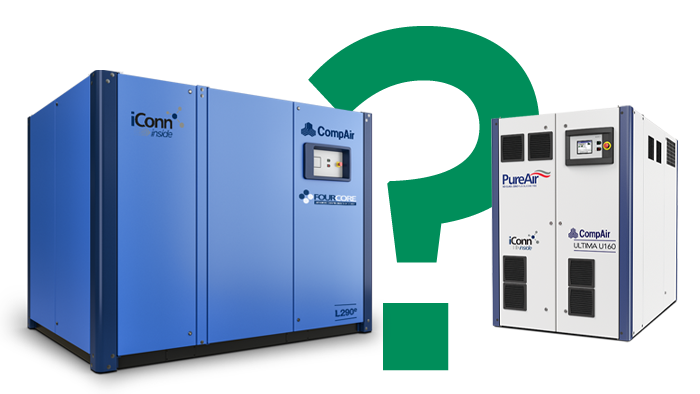Oil-Free vs Oil Compressor
The Importance Of Air Quality
- What is meant by Class 0 or oil-free air? And who needs it?
- Does oil-free compressed air equipment guarantee oil-free air?
- Can Aircare help you achieve Class 0 air? What should you consider when choosing the right machine for your applications?
What Is Meant By Class 0 Or Oil-Free Air? And Who Needs It?

Class 0 is defined by the ISO 8573-1 international standard, which describes it as the highest standard of compressed air purity, meaning that it contains the lowest possible amounts of moisture, oil, particulates and any other contaminants. It is important for a wide range of industries, particularly those whose sensitive applications require clean, oil-free compressed air due to stringent hygiene standards. This includes but isn’t limited to the food and beverage, pharmaceutical, electronic, medical, wastewater, textiles, healthcare and chemical industries. Not only is Class 0 clean air vital to prevent product contamination, but it is also important to prevent pneumatic equipment damage. This is because the presence of moisture in the compressed air that powers this equipment can lead to degradation and corrosion. Subsequently, this can lead to dangerous and costly equipment breakdowns, putting your operation and employees at risk.
Does Oil-Free Compressed Air Equipment Guarantee Oil-Free Air?
Oil-free compressed air does guarantee oil-free air, as the machines require no oil to operate. You can still achieve oil-free compressed air with an oil-lubricated air compressor; it is just wholly dependent on having the right filtration system in place to deal with oil levels and eliminate any oil traces and oil contamination in your compressed air.
Can Aircare Help You Achieve Class 0 Air? What Should You Consider When Choosing The Right Machine For Your Applications?
Aircare can help you achieve Class 0 air, with our range of high-performance oil-free rotary screw compressors, which guarantee the delivery of a continuous supply of ISO 8573 Class 0 certified and silicone-free, clean air. We also offer a comprehensive portfolio of air treatment equipment, including dryers, filtration systems, and condensate management solutions, if your application would benefit from one of our oil-lubricated rotary vane or rotary screw compressors.
To help you make an informed decision on the best type of compressor for your industrial applications, we’ve summarised the key differences between the oil-free air compressors and their oil-lubricated counterpart, focusing on important factors you should consider.
Factors To Consider – Comparing The Two:
- Applications and Desired Air Quality: If your application requires Class 0 air, it really is a no-brainer; you should be implementing oil-free models in your facility. However, if operating in an industry that only requires a high level of air purity, such as the general manufacturing, agriculture, and construction sectors, an oil-lubricated compressor with the appropriate air treatment equipment will still do the job. Some non-contact food and beverage and automotive industrial applications can also use oil-lubricated compressors. It is essential to remember, however, that the most effective way to mitigate risk and prevent product, utility, or air contamination is through oil-free compression.
- Durability: Generally, oil-lubricated compressors are considered more durable and cost-effective, especially for heavy-duty tasks. They also usually have a longer lifespan; however, they also require regular oil changes and produce contaminated air, making them unsuitable for applications that require Class 0 or 100% oil-free air.
- Maintenance: Typically, oil-free compressors offer easy maintenance, as the lack of oil in their system reduces the need for frequent oil changes, helping to keep maintenance costs low. Oil-lubricated industrial air compressors require a much higher level of regular maintenance. However, they often have a shorter lifespan than oil-lubricated equipment, due to less internal lubrication of moving parts.
- Noise: Due to internal lubrication of the compression chamber and moving parts, oil-lubricated industrial air compressors are typically quieter, as they reduce friction and noise. However, in larger environments and for large-scale industrial applications, this shouldn’t make a significant difference.
- Costs: There are four major ways that choosing an oil-free compressor over an oil-lubricated compressor can reduce your costs, these are: lower maintenance costs due to reduced maintenance requirements, lower costs of treating condensate and oil, no filter replacements, and no additional energy costs required to combat filter pressure drops. This is obviously combined with the reduced need for air treatment equipment.
From design and installation to system maintenance and monitoring, Aircare offers the complete compressed air package! Interested in any of our oil-free or oil-lubricated compressors? Why not give us a call and partner with our team today? For more information on any of our solutions or to arrange an appointment, please call 01536 403808 or email us at sales@aircarecompressors.co.uk. Alternatively, you can click here to contact us, and one of our team will be happy to help and answer any questions or queries you may have!
Posted in: Articles





